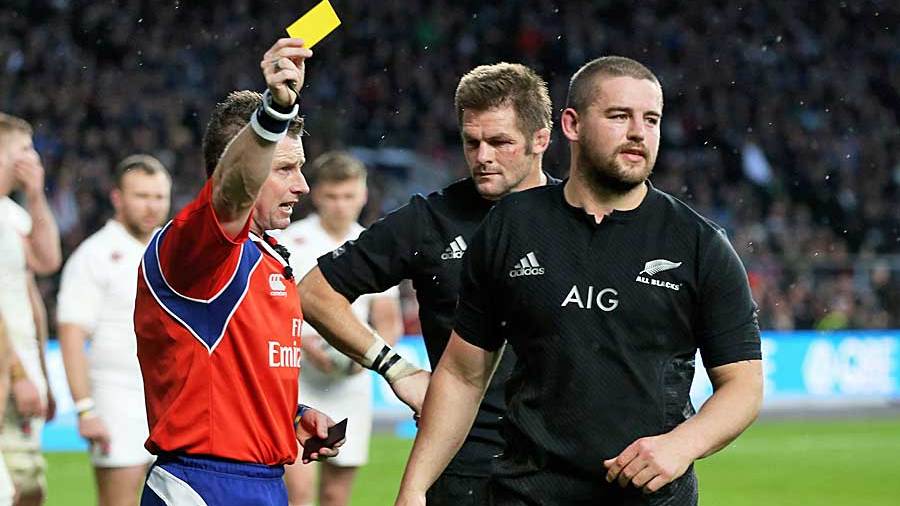|
New Zealand
Practise can only make perfect for sin-bin situations
Sam Bruce
November 11, 2014

Nigel Owens of Wales issued a yellow card to Dane Coles at Twickenham © Getty Images
Enlarge
They call it a "power play" in ice-hockey and water polo, the situation in which one team loses a player for a period of time thus creating a numerical advantage for their opposition. Rugby's yellow-card system follows the same format and, as it's intended, usually results in the offending side struggling for the 10 minutes while their player is off the field. That is unless you're the All Blacks, who seem to be as disadvantaged as Usain Bolt if he started 10 metres behind his 100 metre rivals. As revealed by Cameron McMillan in the New Zealand Herald on Monday, the All Blacks have been reduced to 14 men on seven occasions this season but lead their opposition in total points scored during this period 27-9 - scoring three tries along the way. It's nothing short of miraculous and perhaps one of the major reasons why they have lost just one Test in the past two seasons. So what's their secret? Is it an ability to slow the game down, that age-old art of time wasting by which players are continually stopping to re-tie shoelaces? Or is it simply that the world champions continue to find ways to stay ahead of the game, and may actually be the only nation that boasts a specific plan for instances when they are reduced to 14 men? The All Blacks, themselves, wouldn't confirm or deny whether they created specific "yellow card" situations at training when contacted by ESPN on Monday; but judging by the ease in which they negated England during Dane Coles' sin-binning at Twickenham, one would assume they do. "Sorry, not able to confirm whether we train that or not," an All Blacks spokesman told ESPN. "Suffice to say, we practise a number of game scenarios at our trainings." Yellow cards have the potential to decide matches, and it's unlikely we'll make it through the knock-out stages of the 2015 Rugby World Cup without a sin-binning in the headlines. It's certainly a situation that England and Australia need to work on, specifically as they are the two nations on the receiving end of New Zealand's amazing 27-9 advantage this season. England 21-24 New Zealand (Australia only)
%]So what happened to England at Twickenham, where they lost 24-21? Trailing the All Blacks 16-14 when Coles was dubiously handed his marching orders, the home side's first instinct was to … kick. Fly-half Owen Farrell found touch with the original penalty then, after winning the ensuing lineout, half-back Danny Care opted for the box-kick; it wasn't even a good box-kick. The hosts got the ball back from the All Blacks a couple of minutes later, when Care, again, went to the boot: there was no attempt to build phase-ball or to dent a reduced All Blacks defensive line; it was a complete misuse of their numerical advantage. The visitors, perhaps working to their unconfirmed 14-man game plan, easily fielded the kick again and, after a couple of phases of their own, the largely unheralded Ryan Crotty dropped the ball onto his boot and found touch; this was something his English counterparts had failed to achieve. England must finish games better - Lancaster
%]From there, it was largely all the All Blacks for the remainder of Coles' exile. Sonny Bill Williams made a linebreak from which the All Blacks were eventually awarded a penalty; it was an easy three points that were missed by Beauden Barrett from in front. Did England attempt to win the 22 re-start? No. Farrell kicked long and the All Blacks eventually made their way back up field, where they were awarded another penalty and which, this time, Barrett slotted. When Keven Mealamu replaced Coles at the end of the No.2's sin-binning, England's first ploy was to run. They'd just enjoyed a one-man advantage for 10 minutes and kicked the ball away three times, yet when it was once again 15 on 15 it was time to move the ball. The result? Richie McCaw won a turnover. It has a lot to do with game-management to which ESPN's Tom Hamilton and Greg Growden have both referred since the weekend's action; Hamilton lauded the All Blacks' control while Growden slammed the Wallabies and their handling of the closing stages in Cardiff. As for the All Blacks? Well until the IRB creates another rule by which they're reduced to 13 men, instead of the usual 14, for illegal or cynical infringements they're unlikely to suffer too much stress. That is unless the rest of the world comes up with some unconfirmed plans of their own; good news for everyone else is they have 10 months to do so. © ESPN Sports Media Ltd
|
Live Sports
Communication error please reload the page.
-
Football
-
Cricket
-
Rugby
-
- Days
- Hrs
- Mins
- Secs
F1 - Abu Dhabi GP
Abu Dhabi Grand Prix December 11-131. Max Verstappen ()
2. Valtteri Bottas (Mercedes)
3. Lewis Hamilton (Mercedes)
4. Alexander Albon ()
5. Lando Norris ()
6. Carlos Sainz Jr ()
-
ESPNOtherLive >>
Golf - Houston Open
Snooker - China Open
Tennis - Miami Open

